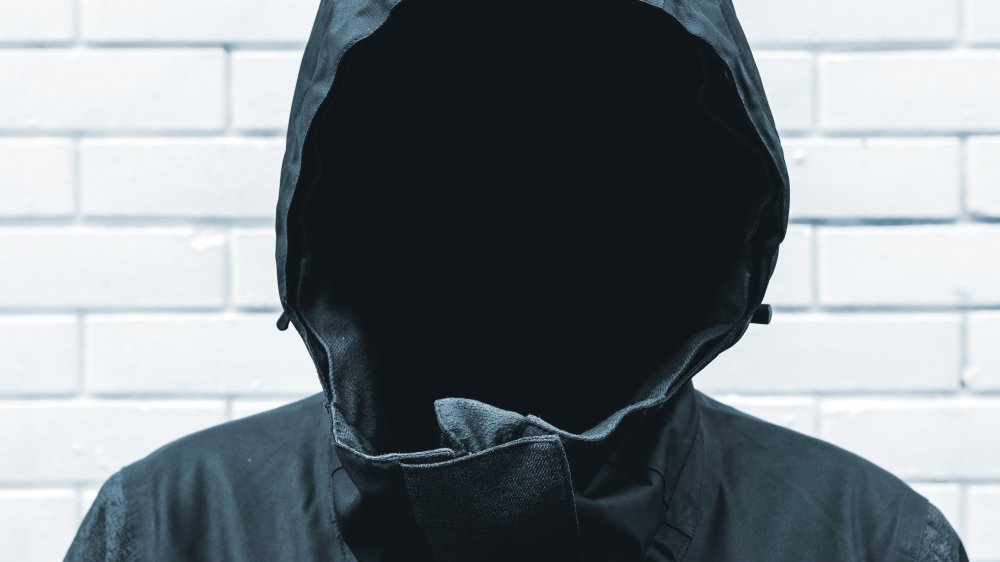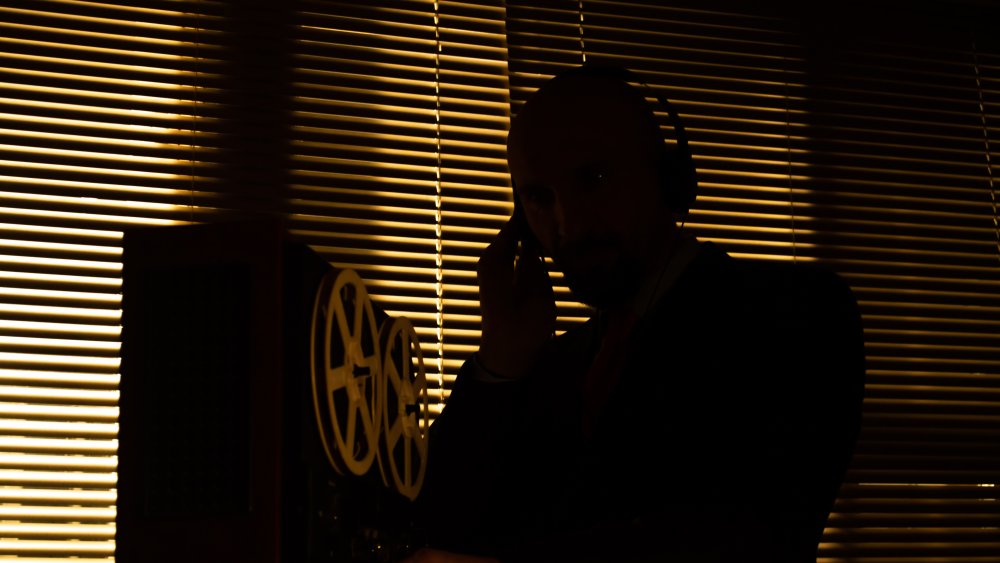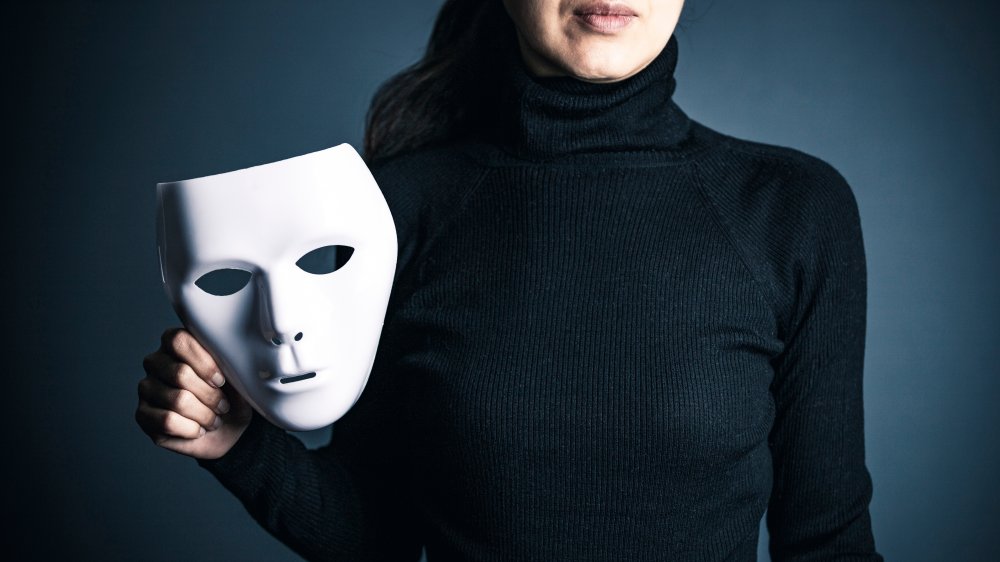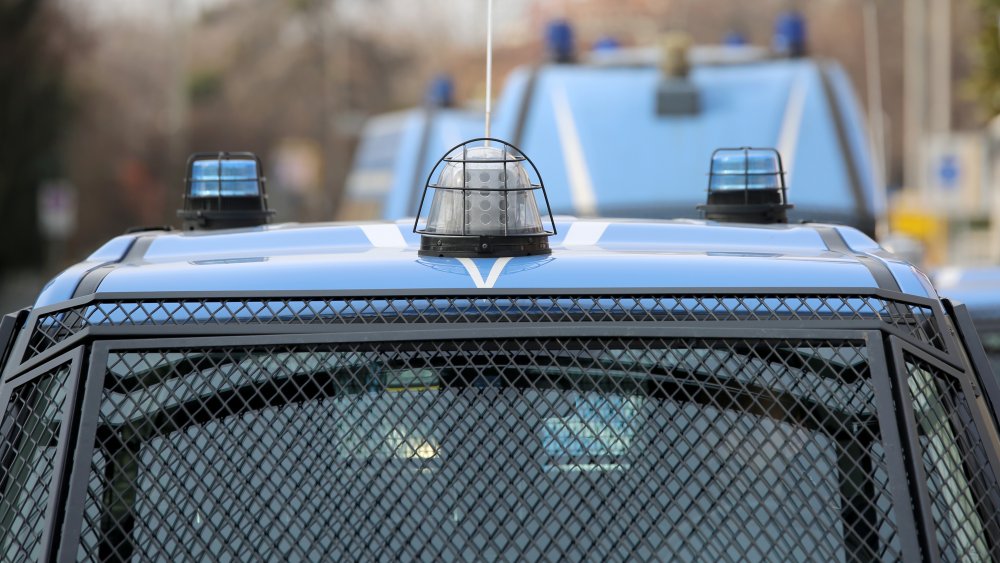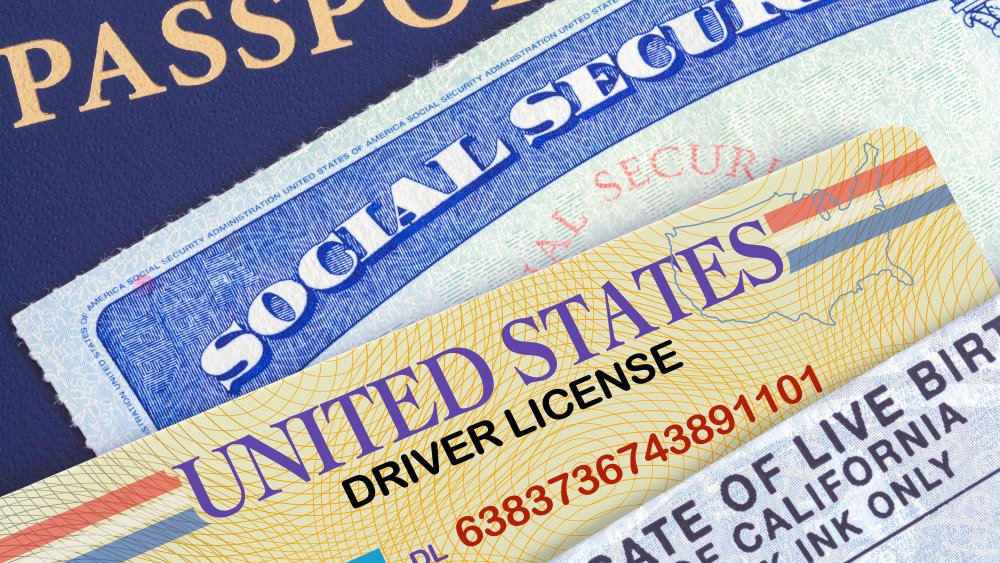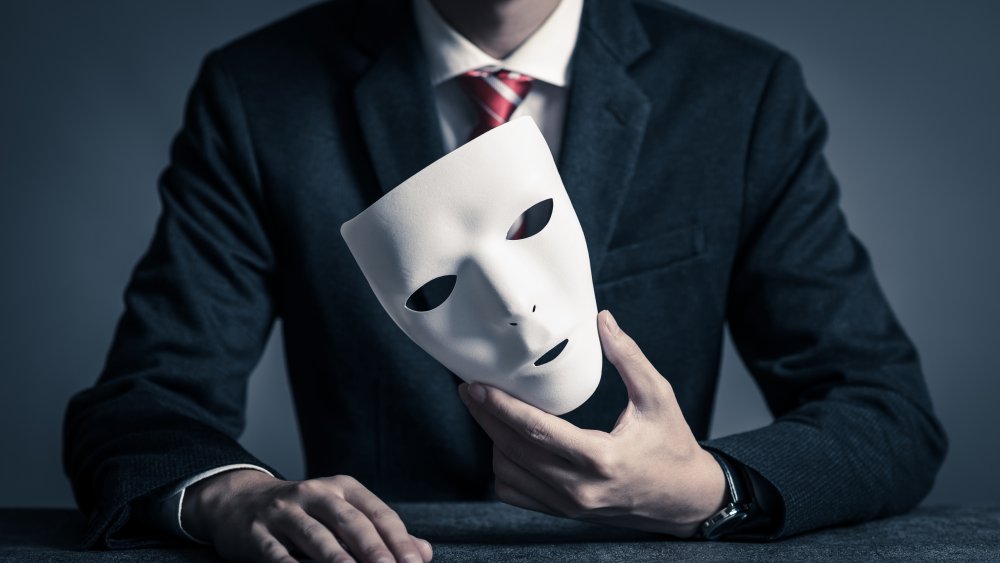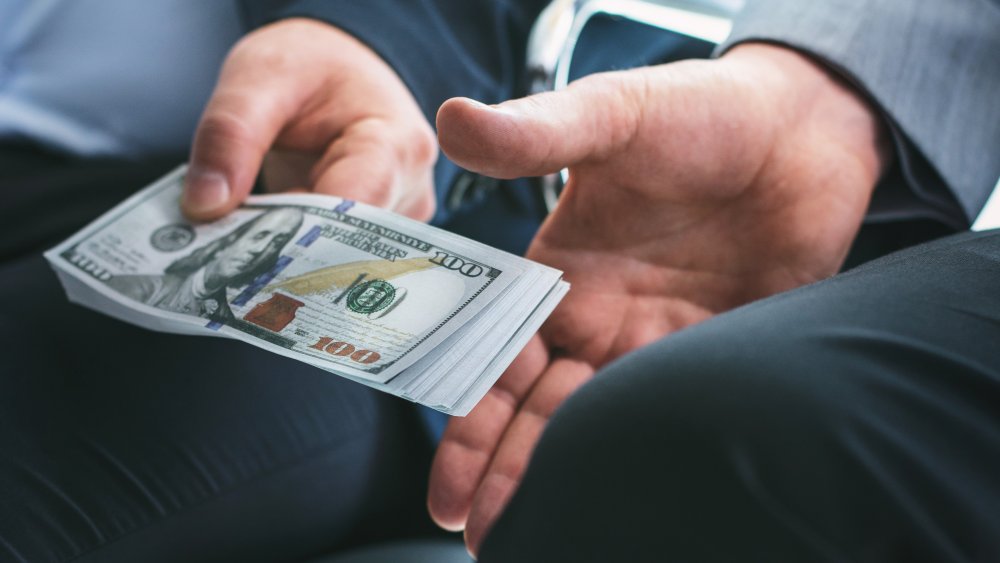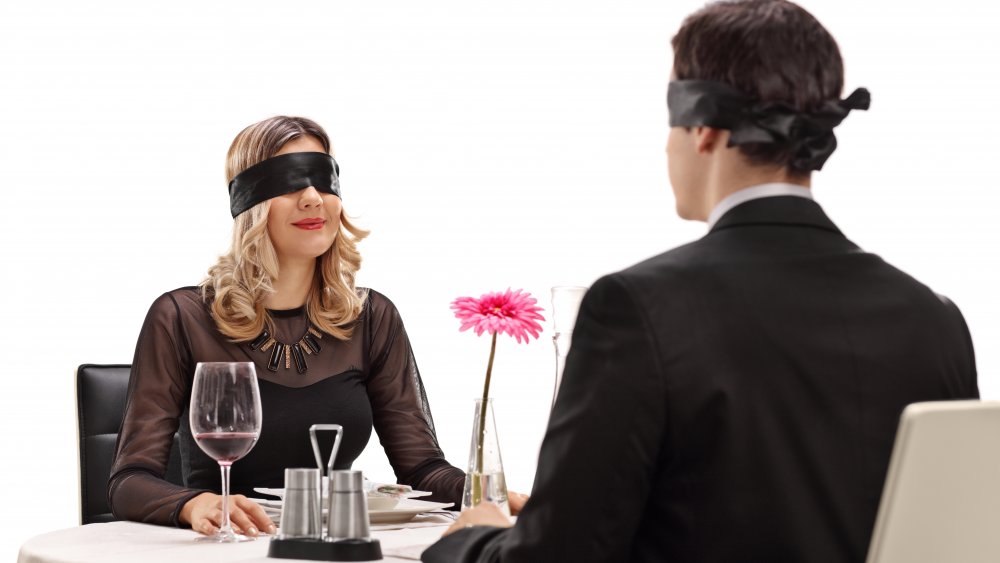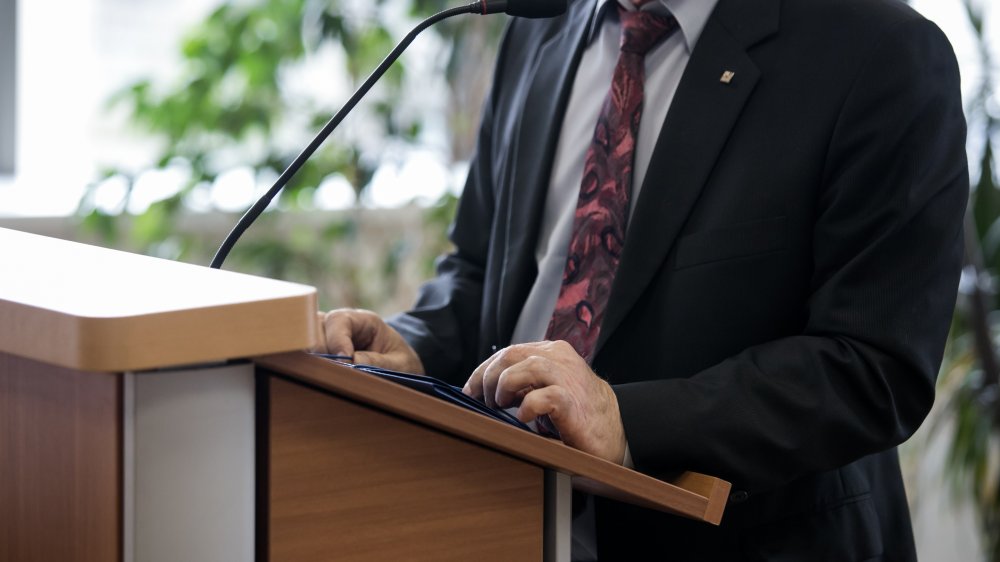The Truth About Witness Protection In The United States
One day, you're living an ordinary life. Getting groceries, taking care of the kids, chilling by the pool with a nice drink ... and then, the cops bust in, you find out that your spouse is actually a notorious gangster, and your only hope for a normal life — or, for that matter, not ending up on the other side of a sniper scope — is to enter witness protection. Sound like something you've seen in a movie or two?
Well, it doesn't just happen in Hollywood. In real life, the Federal Witness Protection Program, also known as the Witness Security Program (or WITSEC for short) has sometimes been a controversial entity, and it's left scars on the lives of real people. But it's also protected the lives of numerous individuals who are involved with some incredibly dangerous stuff. While most of the program's inner workings are kept under wraps, as you'd expect, a number of surprising details have leaked out over the years. So if you've ever wanted to find out more about this secret organization (without, you know, ticking off a mob boss), keep on reading for the truth about the United States' Witness Protection Program.
The U.S. Witness Protection Program has been operating for a long time
The founder of WITSEC was Gerald Shur, a Justice Department employee who spearheaded the program in 1971 and was in charge of it for many years. The program's goal was to flip some of the top Mafia men out there, by giving them the ability to have a new life ... at the cost of, you know, twisting the knife on their even more problematic leaders, allies, and so on. Given that no person is totally isolated, WITSEC also provides protection for the family members of such individuals. These folks are sometimes totally innocent bystanders who might've had no idea that their family member was involved in such dirty business.
Since getting launched, the Federal Witness Protection Program has ensured the safety of over 18,000 federal witnesses and their families. That's a huge, huge number of people when you stop to think about it. The program claims that, since being founded, "no Witness Security Program participant, following program guidelines, has been harmed or killed." That said, as Popular Mechanics points out, the key words there are "following program guidelines" which means ... what, exactly? What are those guidelines? Nobody knows, unless you're part of this top-secret program, but presumably, breaking the rules carries steep consequences.
How does witness protection work?
In the movies, witness protection is usually just referenced in a quick scene at the end, to let you know that the protagonist's innocent spouse will be A-okay since they have a new life in Michigan, New Mexico, or what have you. In real life, though, how does the government go about setting up a new life for you? Isn't that ... uh, complicated?
Well, yes. First off, the relevant government agencies will be asked (much to their chagrin) to produce a new birth certificate, social security card, driver's license, credit report, and (if you have kids) report cards, according to Priceonomics. For what it's worth, if your kid has a middling C+ average, they'll refuse to change it to a better grade. Your request for a new life in Hawaii will be deliberately ignored, according to Popular Mechanics, since your interest in a location implies ties to that area, but the program will try to relocate you somewhere that you fit in. So, for example, if you grew up on a farm in rural America, you won't end up in a packed Los Angeles beach community. Once you reach your new home, a U.S. marshal known as a witness inspector will help you craft a new background story — for example, if you're supposed to be from Alaska, you better know something about Alaska — including family info, employment history, and all those details that make a fake life seem real.
Once you enter, you'll need a new name
If your name is Robert, but everybody knows you as Bobby, and you've tried hard to get people to call you "Rob" ... well, you know how weird it can be to have everybody refer to you as something different. However, if you enter the Witness Protection Program, you'll need to replace your old name. Don't worry, though. You won't be handed something dumb like Jimmy Joe Jameson or whatever. You'll be allowed to harness your creative energy and come up with your own new name, just like when you named your kids.
This is the most surreal part of the process for many people, according to Priceonomics, as it's the point where the whole "you're a new person" vibes really sink in. The program advises you to keep the same initials or even the same first name, according to How Stuff Works, to make the transition a little bit easier. That said, some people never get used to it. According to one woman who entered the program when she was only seven years old (via the Billings Gazette), the new name left her feeling as if she was in "identity limbo." Looking back, she says, one of her clearest memories from the Witness Protection Program experience involved sitting by a swimming pool, as a child, spending hours learning to write the new name that her mother had chosen for her.
Yes, witness protection has an orientation program
Naturally, crafting a new identity and a new life for yourself isn't easy, especially if you're a bad liar, prone to blabbing, or were never trained to be an FBI agent. So, just like when you start a new job or get assigned to jury duty, new members of the Federal Witness Protection Program have to go through an orientation. Are there PowerPoint presentations to sit through? Who knows.
Needless to say, though, it's not like most orientations. The WITSEC Safesite and Orientation Center is located in a top secret location, according to Witsec: Inside the Federal Witness Protection Program — in 1988, at least, the building was discretely placed in a Washington D.C. suburb — and the not-so-cheerful orientees are brought there in armored vehicles with blacked-out windows, just to ensure that they can't figure out where they're being taken. These people are then offered both psychological and physical examinations to ease them into the new life transition and help with the trauma that such a change creates, particularly on families. Visitors are kept separated from one another, and after two weeks of hotel-style accommodation, they're shown videos of their new home, wherever it may be.
It can ruin childhoods
Destroying your old life to begin another is a traumatizing experience. Sure, it's better than getting murdered, but at least one protected witness from the UK program, going under the pseudonym "Rachel," told The Guardian that being in witness protection has made it impossible for her to form genuine new friendships or other relationships with normal people because she can't be honest about her story. This unhappy situation leaves her in what she describes as "an alien wilderness."
Adult trauma is one thing, of course, but childhood trauma leaves even deeper scars. Imagine, as a child, being suddenly isolated from friends, family, the life you knew, and everything you ever considered "home." To make it worse, as reported by ABC News, the whole thing happens in the blink of an eye. According to Jackee Taylor, a woman who went into witness protection as a young girl, she was woken up in the middle of the night when the U.S. Marshals came in, removed the family from their house, and hurried them into black vans. From there, they were relocated to a hotel in Montana. All these years later, Taylor says, going back to the hotel still brings back an overwhelming flood of traumatic memories.
Witness protection can lead to some unfortunate ... paperwork problems
The psychological trauma is bad enough, but when you're a child who grows up in the Witness Protection Program, how does that impact your future life trajectory? Namely, is it possible to build a good life for yourself and your children, or do the past sins of your parents (or whoever got in trouble in the first place) continue to hit you like a hammer, year after year?
Sadly, paperwork problems can be a real hazard. For instance, when Jackee Taylor went into witness protection at seven years old, she says that the U.S. Marshals did provide her with a passport, but never a birth certificate. As a kid, this isolated her from her peers, according to the Billings Gazette, since it became difficult to prove her identity for sports, Girl Scouts, and other extracurricular activities. Getting into college was a struggle. Getting married was a bigger one. The problems hit fever pitch when she became a mother, according to ABC News. Once her passport got lost, she was left with no way to prove her citizenship, and then her children were denied medical coverage due to her lack of documentation. This nightmarish scenario drove Taylor to contact marshals, her governor, and countless other officials until finally, after having zero luck, she felt that she had no choice but to leave the program and go public — potentially risking her life, and those of her family — in a desperate effort to get her children's healthcare covered.
Most people in witness protection are criminals, not victims
While the term "witness protection" tends to conjure up images of children, spouses, and grandparents who are forced into hiding due to the illegal and/or immoral action of a guilty party, WITSEC claims that the majority of the people in the program are the "criminals" themselves, according to CNN. Gerald Shur, the Witness Protection Program's founder, estimates that this accounts for about 95 percent of the people they maintain the safety of, though he's careful to point out that these people aren't always the sort of mobsters, crime bosses, or murderers you might expect.
Often, they can be individuals who considered themselves non-criminals until they performed a single criminal action that got them in hot water, such as the one engineer who paid off his local mayor for certain favors. The reason these people are entered into the program, generally, is to get their witness testimony in order to successfully convict a more dangerous party, in exchange for legal forgiveness and anonymity. As Shur tells it, "Not everybody is a killer or a member of the Hell's Angels or the mob, but there are people who are doing business with criminals. They might say they were legitimate businessmen, but they would bribe people."
What's your financial picture like?
Before you consider witness protection as a risky way to pay off your student loans, you should know that going into the program isn't like winning MegaBucks or Powerball. While the program definitely acknowledges that you'll need some financial help to get a new life started, you won't be afforded a life of luxury, and according to How Stuff Works, the government won't even pay off your debts. You'll be given temporary housing, according to Gizmodo, in the form of a hotel — at least, until they find a proper new home for you, which will probably be an apartment of some sort — and in addition to covering your living expenses and working to find new jobs and schools for your family, they'll pay you via a monthly stipend. Back in 2005, The Lodi News-Sentinel reported that protected families received an average of around $60,000 a year until they could get back on their feet. This number probably varies depending on the locale, and it's unknown if it has gone up since the '00s.
This overall picture is a far cry from some of the lucrative benefits enjoyed by witnesses in the '70s and '80s. Back then, the program was so dedicated to ensuring Mafia witness cooperation that they paid for some ridiculous costs. According to the LA Times, one fellow named "Jimmy the Weasel" received $1 million. But it gets even crazier than that, as the program also paid for Jimmy's wife to have a face lift, dental work, and breast implants.
How do you know if your new date is secretly in witness protection?
It's one thing to use your new employment history to find work, but what about a new social life? It's complicated for witnesses to make friends or romantic partners. After all, as The Guardian points out, they're unable to ever, ever discuss their past, much less whatever huge trauma they've certainly endured.
This raises a big question. Namely, when you go out on a big date with someone, and they act all weird about it every time you ask what their family is like, how can you tell if they're in witness protection? The bottom line is, well, you can't. Unless they're a lousy liar, anyway. Even if a person in the program meets the love of their life, according to Pete Earley's Witsec: Inside the Federal Witness Protection Program, they're expected to spend the entirety of their happily-ever-after lying about where they come from. Probably not the secret to a healthy marriage, that's for sure, but as a former WITSEC inspector told Earley, "You had to look down the road. What if there was a divorce and the spouse went running to the mob for revenge?"
And yes, people really do unknowingly get hitched with witnesses. That's what happened to Sherry Anders in 1981, according to an archived issue of The Bulletin, who had no idea that her husband Martin Lewis was actually Henry Hill, the notorious gangster later played by Ray Liotta in Goodfellas.
When witnesses testify, how do they stay safe?
Amidst all this focus on what happens after everything's said and done, it's easy to forget that the entire reason this program exists is to make it safe for witnesses to testify. How does that happen, though, when the people that the witnesses are reporting on are such bad actors, tied to Mafia rings, terrorist groups, and so on?
Maximum security is a necessity from the very start, according to How Stuff Works. Any request for a witness to testify must come through the Marshals Service or the Office of Enforcement Operations with a minimum of ten days' notice, and these interviews can only happen at sites officially designated as being neutral. Even then, getting the witnesses to these sites, safely, is a challenge unto itself, involving all kinds of crazy transportation shenanigans such as helicopters, covert fishing boats, mail trucks, or even the use of armored cars with a full police escort as a distraction while the witness is transported separately.
What happens if you come out of the dark?
Being in the Witness Protection Program isn't easy. It isn't fun. But also, as pointed out by Popular Mechanics, it's completely voluntary. Despite the cloak and dagger routine and all the falsified documents, anyone in the program has the freedom to leave at any time. That said, dropping out of witness protection is kind of like going AMA (against medical advice). It's not advised, you won't be supported, and the risks are real. Keep in mind, if you've wound up in witness protection, you're probably connected to some seriously dangerous organizations, so it's no wonder that the dropout rate is so low.
A few people have managed to come out of it without getting killed or threatened, though. The Billings Gazette reports that Jackee Taylor, for instance, claims to have run across a Hell's Angels gang member acquainted with her father who said that she had nothing to fear from them. On the other hand, you have stories like that of gangster Henry Hill, who dropped out and opened a restaurant in Connecticut, which was rapidly torched down. Even worse? The cases that don't make it to the news. Gerald Shur related one such story to CNN, where a witness-gone-public went home, turned the doorknob, and was blown up. That certainly makes a strong case for never revealing one's identity, despite the anxiety and isolation such secrecy causes.
